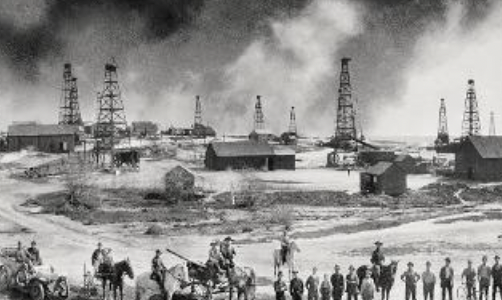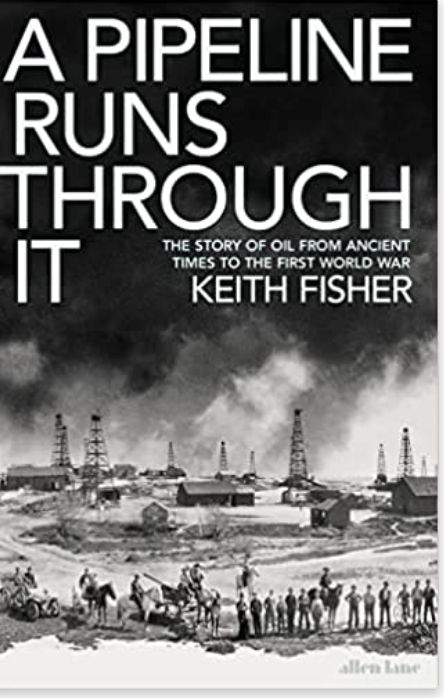
Politics of Oil

Petroleum has always been used by humans, from time immemorial as a waterproofing agent in Noah’s Ark, as a weapon during the Crusades, and as an adhesive for Neanderthals. Its eventual extraction from the earth in vast quantities transformed into light, heat, and power. A Pipeline Runs Through it, looks at the social, economic, political, and geopolitical forces involved in our transition to the modern oil age and tells the story from the pre-industrial history of petroleum through to large-scale production in the mid-nineteenth century and the development of dominant, fully-fledged oil industry by the early twentieth century. Winston Churchill was appointed first Lord of the Admiralty in October 1911, Sir John “Jackie” Fisher had only just retired as First Sea Lord, the Navy’s military commander, and Churchill, the civilian head of the Royal Navy, wanted to put him back to work to campaign for the modernisation of the fleet that both men saw as urgently needed.
Fisher was regarded as a pioneer in everything from submarine warfare to the use of OMG ( Oh my God), and the greatest innovator the Royal Navy ever produced. He began his career as a midshipman in the age of sail and ended it commissioning fast battleships that saw service throughout the Second World War. At the beginning of the 20th century, his passion was the need to shift the navy from coal to oil for propulsion. He then became known as “the Oil Maniac”. He won the argument and Britain’s first oil-only battleship, the HMS Queen Elizabeth was launched in October 1913. The Royal Navy’s shift away from coal, matched by the fleets of other great powers including Germany and the US, was a critical step in the inauguration of the age of oil, creating a new web of international relationships that in many cases survive to this day. The surge in oil prices following Russia’s attack on Ukraine has been a timely reminder that the oil age is still with us, despite repeated attempts to move past it.
The global rivalry between Standard Oil and Royal Dutch Shell in the early 20th century is carried on by their successor companies today. Routes for Russian oil to reach export markets were a concern for Tsar Nicholas II, just as they are for Russian President Vladimir Putin. Oil had many advantages over coal as a fuel for warships, as it allowed greater speed, because its energy density is higher, and greater maneuverability, as the heat in the boilers could be varied by adjusting control valves, rather than stokers shoveling coal, which meant ships could have smaller crews, and enabled ships to refuel at sea, rather than coming into port for coaling. Churchill understood that the Royal Navy, essential for defence of Britain and its Empire, would have seen at a critical disadvantage if its ships had remained coal-fired while other nations moved to oil.
Britain was the world’s largest coal producer in the 19th century, but its oil output was negligible. The commitment to an oil-fuelled fleet required commercial, diplomatic and military efforts to secure sources of global supply, which became Churchill’s other great preoccupation in the years leading up to the first world war. He backed the British government to take a controlling stake in Anglo-Persian Oil, a company founded by the English entrepreneur William Knox D’Arcy that was eventually to become BP. D’Arcy secured the rights to find and produce oil across a huge area of Persia in 1901 and after years of unsuccessful exploration finally discovered large reserves in 1908. Keith Fisher sets out the positions of key players- including Marcus Samuel, founder of Shell, John D Rockefeller, founder of Standard Oil, and the entrepreneur Calouste Gulbenkian – who shaped the early years of the oil age. Fisher states “ The Dependency of Britain and its allies on the United States for their oil supplies during both world wars was one of the primary reasons why the US would take over Britain’s position as the world superpower.” Kieth Fisher has worked as a journalist and researcher on corporate and environmental issues studying MI6 and CIA orchestrated a coup against Iran’s elected Prime Minister Mossadegh in 1953 following his nationalisation of the Anglo-Iranian Oil Company, Churchill’s government backed the 1953 coup that overthrew Iran’s elected prime minister Mohammad Mosaddegh after he had nationalised the country’s oil industry. The consequences of that coup still loon over Iran today.
The energy transition away from fossil fuel promises to break some of the chains of dependence created by the need for oil, albeit at the expense of creating new dependencies for critical minerals such as lithium.
This was always a story of imperialist violence, political disenfranchisement, economic exploitation, and environmental destruction. The near total eradication of the Native Americans of New York, Pennsylvania, and Ohio has barely been mentioned as a precondition for the emergence of the first industrialised oil region in the United States. Britain’s invasion of Upper Burma in 1885 was perhaps the first war fought, at least in part, for access to oil, the growth of Royal Dutch-Shell involved the genocidal subjugation of people of the Dutch East Indies and the exploitation of the oil in the Middle East arose seamlessly out of Britain’s prior political and military interventions in the region.
British Navy’s increasingly desperate dependence on vulnerable foreign sources of oil may have been a catalytic ingredient in the outbreak of the First World War. The rise of oil has shaped the modern world.
A Pipeline Run Through It: The Story of Oil from Ancient Times to the First World War by Keith Fisher, Allen Lane £35, 768 pages
